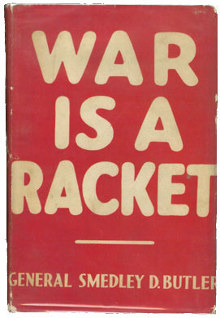War_is_a_Racket
War Is a Racket
1930s speech and book by Smedley D. Butler
War Is a Racket is a speech and a 1935 short book by Smedley D. Butler, a retired United States Marine Corps Major General and two-time Medal of Honor recipient.[2] Based on his career military experience, Butler discusses how business interests commercially benefit from warfare. He had been appointed commanding officer of the Gendarmerie during the 1915–1934 United States occupation of Haiti.
This article needs additional citations for verification. (December 2016) |
After Butler retired from the US Marine Corps in October 1931, he made a nationwide tour in the early 1930s giving his speech "War Is a Racket". The speech was so well received that he wrote a longer version as a short book published in 1935. His work was condensed in Reader's Digest as a book supplement, which helped popularize his message. In an introduction to the Reader's Digest version, Lowell Thomas, who wrote Butler’s oral autobiography, praised Butler's "moral as well as physical courage".[3]
